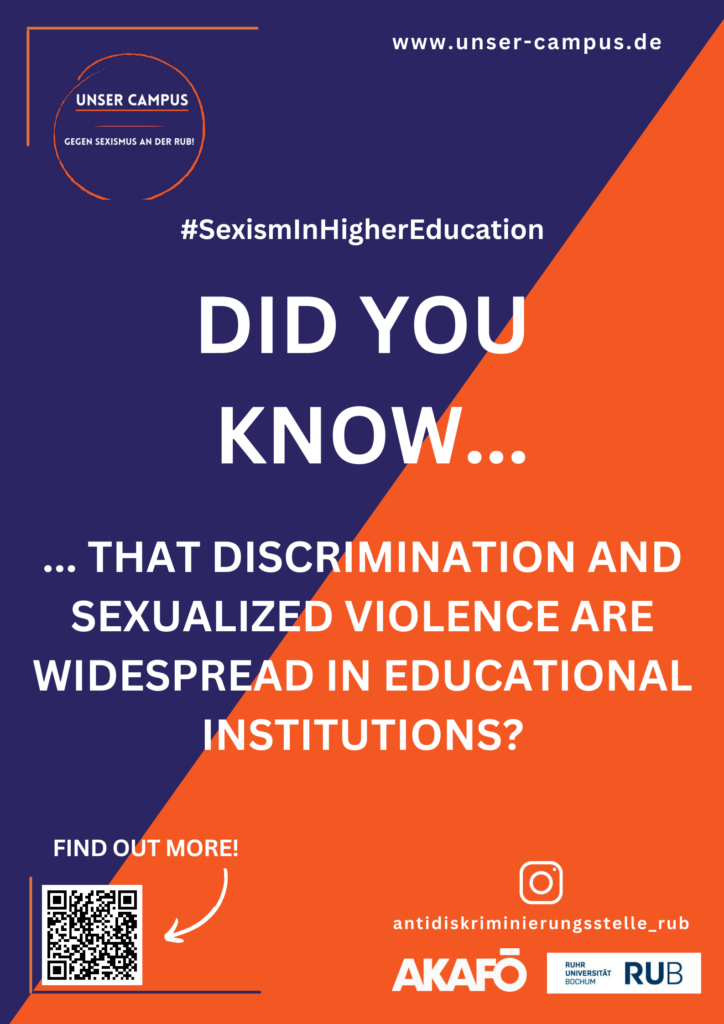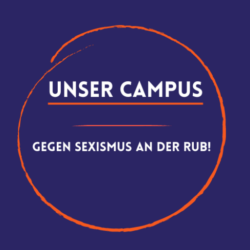
Discrimination in educational institutions
While educational institutions should be places where equal opportunities and diversity are promoted, structures and attitudes still exist that favour disadvantage and discrimination against groups and individuals at university. Some of the most common forms of discrimination are: Sexism, Racism, Sexual Orientation Discrimination, Ableism, Classism, Religious Discrimination, Ageism and Queerism. This list is by no means exhaustive, but is intended to illustrate that people (may) experience discrimination in the higher education context on the basis of a wide range of identity characteristics.
It is important to note that these characteristics are often interlinked and can lead to multiple discrimination of groups and individuals (the concept of „intersectionality“ analyses how different forms of discrimination interlink and impact each other).
Experiences of discrimination at the Ruhr University Bochum
In the study „Experiences of Discrimination at RUB“ (2023), 14.69% of the students surveyed stated that they experienced discrimination at RUB with some regularity. Discrimination based on gender, racial discrimination and discrimination based on the educational background of the parents were named most frequently (p. 6). The study also illustrates that students‘ experiences of discrimination have a significant impact on their performance, life satisfaction and satisfaction with their studies (p. 11). Universities should strive to create an inclusive and non-discriminatory environment where all members of the community have equal opportunities. With the Anti-Discrimination Policy and the establishment of the campus-wide Anti-Discrimination Office, RUB is actively working to create university-wide netiquette, transparent procedural processes, as well as support structures for those affected.
Sexism and sexualised violence in universities
Many higher education institutions face major challenges when it comes to addressing and preventing sexism and sexualised violence. These phenomena are deeply rooted in the structures of educational institutions and are reinforced by various factors, such as a lack of gender equality policies, a lack of policies and initiatives to promote gender equality and pronounced hierarchies where professors, lecturers and staff have a dominant position of power over students. This imbalance can be exploited by some individuals to perpetrate sexual violence. The fear of possible negative consequences for the academic career and the knowledge of the dependence on the persons in positions of power leads to many cases of sexualised violence going unreported. Discrimination against FINTA* persons in the university context is manifested through phenomena such as the gender pay gap, the under-representation of women in higher academic positions such as professorships and leadership positions, fewer research opportunities, unfair selection procedures, inappropriate sexist behaviour, microaggressions and prejudice, among others. To effectively combat sexism and sexualised violence in universities, a comprehensive and structured approach is needed that rethinks institutional structures and cultural norms and ensures that all members of the university community are respected and protected. Systematic prevention of sexist discrimination and sexual violence requires gender equality programmes that facilitate access to academic positions for FINTA* and other marginalised groups, awareness-raising and training to help identify and reduce sexist behaviour, and the promotion of women researchers and the creation of networks. It is also very important that universities take clear institutional responsibility for sexualised violence and create comprehensive support structures for those affected. It requires not only policies and resources, but also a change in campus culture to create an environment where sexism and sexual violence have no place.
OUR CAMPUS – a campaign against sexism at the RUB!
The RUB and AKAFÖ are promoting precisely this change in campus culture with the project OUR CAMPUS – A Campaign against Sexism at the RUB!
OUR CAMPUS aims to raise awareness of sexism and sexualised violence in the university context among all RUB members and at the same time promote a generally stronger sense of responsibility for a discrimination-free campus. The project also aims to develop practical skills in everyday university life and to raise awareness of important contact and counselling points on and off campus. Our new awareness campaign addresses all university members and wants to inform them analogue and digitally about sexism and sexualised violence in the university context, explain the causes and consequences of sexism and encourage people to question their own attitudes and behaviour and to stand in solidarity with those affected.

Got curious?
Follow us on Instagram at @antidiskriminierungsstelle_rub and visit our blog to never miss any news and actions! We are also very happy to receive enquiries for cooperations and workshops.
Have you experienced or observed discrimination at the RUB? Then you can contact the following contact points at any time:
If you are in an acutely dangerous situation on campus or you feel uncomfortable or unsafe, you can contact the RUB Control Centre at any time on this number: 0234/3223333.
The RUB Anti-Discrimination Office offers confidential and impartial individual counselling sessions on all forms of discrimination for all members of the Ruhr-Universität. Or write directly to antidiskriminierung@rub.de
Are you FINTA*?
Then you can contact the RUB Equal Opportunities Office or the Equal Opportunities Officer in your faculty. They will give you completely confidential advice. You can find a list here. Or just write directly to gleichstellung@rub.de
The autonomous queerfeminist department regularly offers events and advice on the topic. You can also network with other FINTA* on campus.
Email: aqfr@rub.de
Instagram: @queerfeministreferatrub
You are queer?
The initiative Queer at the RUB offers opportunities for exchange and collects all important information for queer university members.
The autonomous gay* department is the central contact point for gay* students. You can find more information here.
E-Mail: schwulenreferat@rub.de
In Bochum
Wildwasser e.V. is a counselling centre for victims of sexualised violence and for prevention work in Bochum. They advise and accompany those affected.
Rosa Strippee.V. is the contact point for LGBTQIA+ persons in Bochum. Among other things, the association offers the possibility to report cases of violence directly to you online. More information here.
Throughout Germany
The helpline „Violence against women“ offers confidential and free help and support 365 days a year, around the clock, anonymously, in several languages and barrier-free throughout Germany on 08000 116 016 and via online counselling.
Men can also receive support and counselling by calling the „Violence against Men“ helpline on 0800 123 9900.
Sources and furtherreading:
Alves, H., Woitzel, J., , Fereidooni, K., Sabisch, K. ,& Karle, I. (2023): Studie zu Diskriminierungserfahrungen unter Studierenden der Ruhr-Universität Bochum. https://doi.org/10.13154/294-10183 https://news.rub.de/sites/default/files/diskriminierungserfahrungen_unter_studierenden.pdf (zuletzt abgerufen am 09.10.23)
Antidiskriminierungsrichtlinie der Ruhr-Universität Bochum, 2023. https://uni.ruhr-uni-bochum.de/de/antidiskriminierungsrichtlinie-der-ruhr-universitaet-bochum
Diehl, C., Hunkler, C., & Kristen, C. (Hrsg.) (2016): Ethnische Ungleichheiten im Bildungsverlauf: Mechanismen, Befunde, Debatten. Wiesbaden: Springer VS.
Heublein, U., Ebert, J., Hutzsch, C., Isleib, S., König, R., Richter, J., & Woisch, A. (2017): Zwischen Studienerwartungen und Studienwirklichkeit: Ursachen des Studienabbruchs, beruflicher Verbleib der Studienabbrecherinnen und Studienabbrecher und Entwicklung der Studienabbruchquote an deutschen Hochschulen. (Forum Hochschule 1/2017). Hannover: DZHW.
Hillmert, S., & Jacob, M. (2010): Selections and social selectivity on the academic track: A life-course analysis of educational attainment in Germany. Research in Social Stratification and Mobility, 28(1), 59-76. https://doi. org/10.1016/j.rssm.2009.12.006
Mense, L., Mauer, H., Herrmann, J. (Hrsg.) (2022): Sexualisierter Belästigung, Gewalt und Machtmissbrauch entgegenwirken. Handreichung. Studien Netzwerk Frauen- und Geschlechterforschung NRW Nr. 37.
Pantelmann, H., Blackmore, S. (Hrsg.) (2023): Sexualisierte Belästigung, Diskriminierung und Gewalt im Hochschulkontext. Herausforderungen, Umgangsweisen und Prävention. Wiesbaden: Springer Gabler. https://doi.org/10.1007/978-3-658-40467-3 https://link.springer.com/book/10.1007/978-3-658-40467-3
Williams, T. R. (2005): Exploring the impact of study abroad on students’ intercultural communication skills: Adaptability and sensitivity. Journal of Studies in International Education, 9(4), 356-371. https://doi. org/10.1177%2F1028315305277681
Zimmer, L. M., Lörz, M., & Marczuk, A. (2021): Studieren in Zeiten der Corona-Pandemie: Vulnerable Studierendengruppen im Fokus. Zum Stressempfinden vulnerabler Studierendengruppen. (DZHW Brief 02/2021). Hannover: DZHW. https://doi.org/10.34878/2021.02. dzhw_brief

